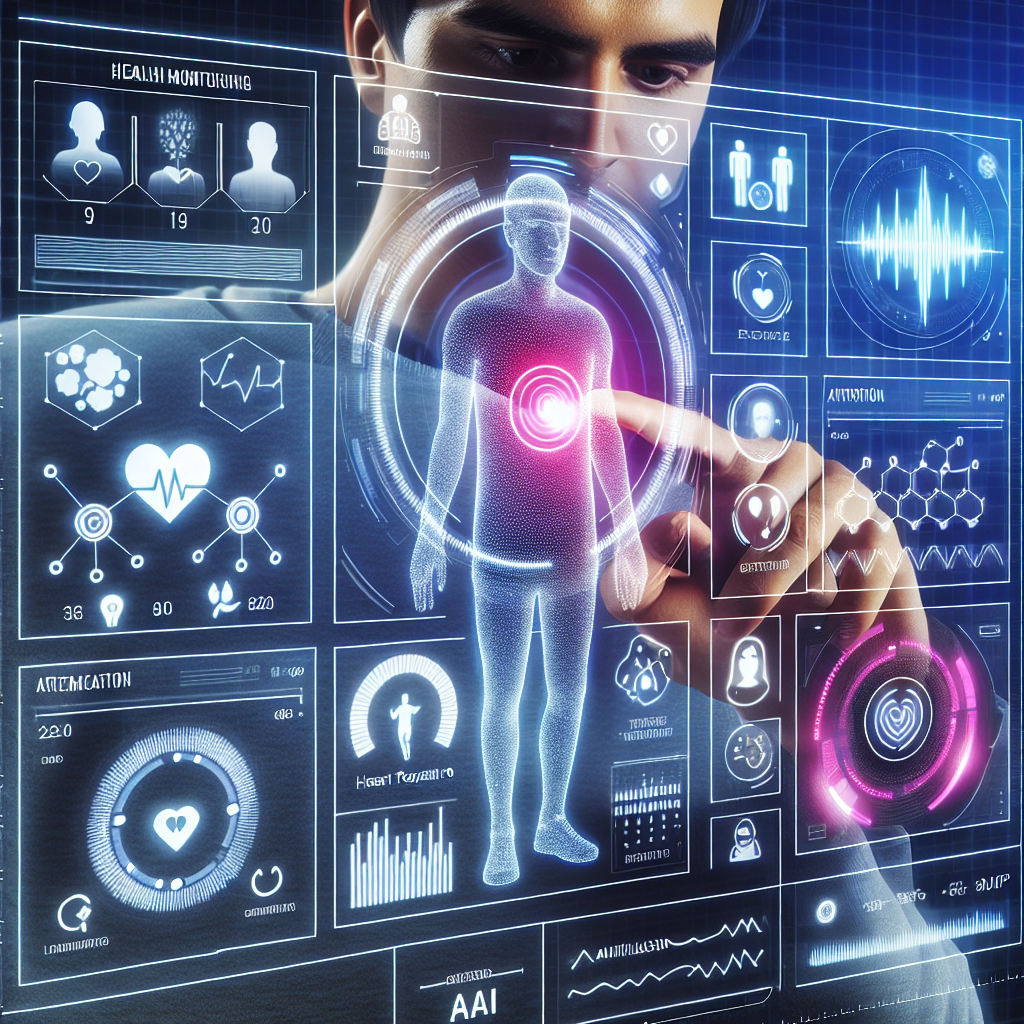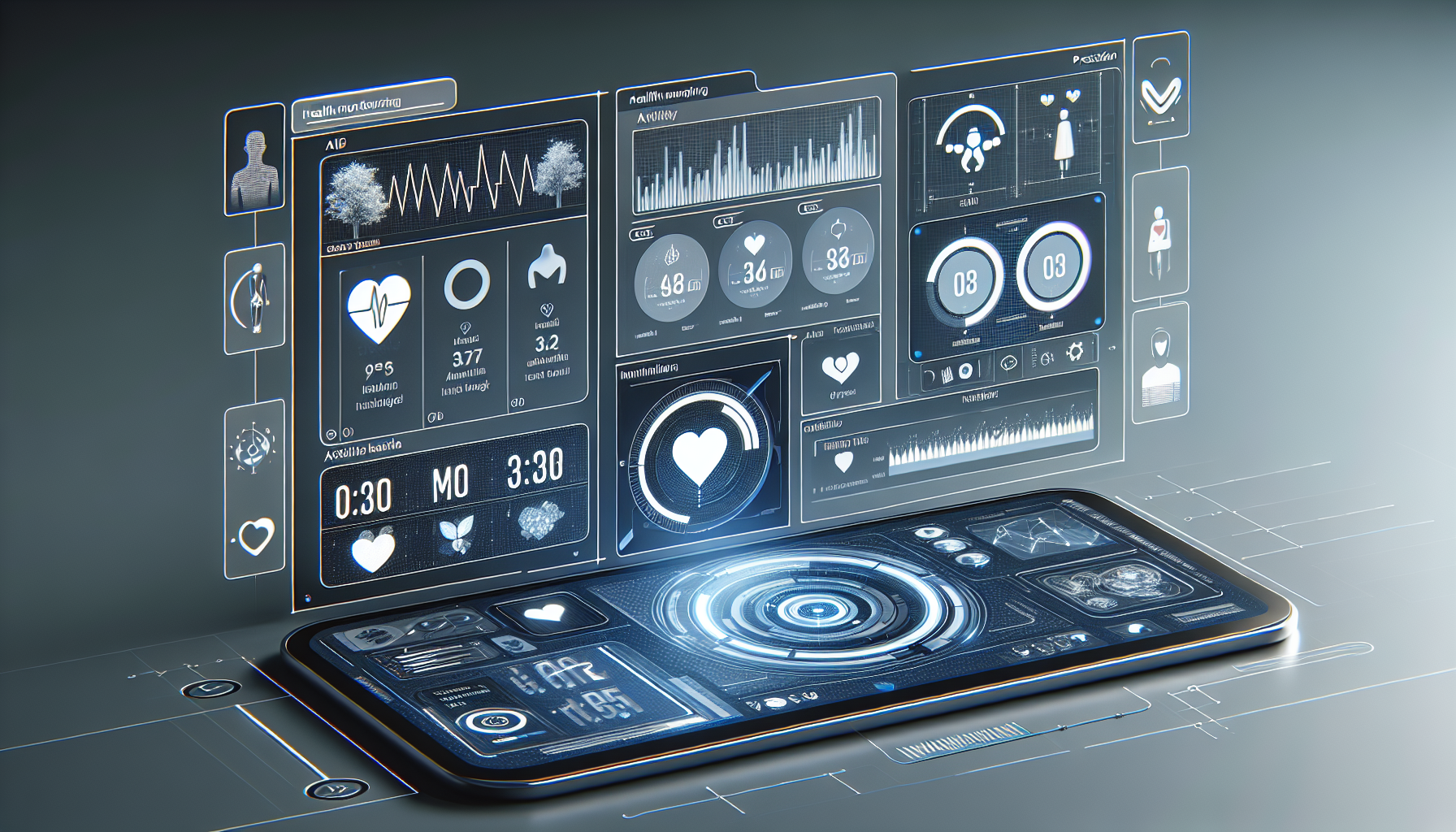AI-Driven Insights for Precision Health Monitoring

Leveraging AI for Predictive Analytics in Chronic Disease Management
In the realm of healthcare, the advent of artificial intelligence (AI) has heralded a new era of precision and personalization, particularly in the management of chronic diseases. AI-driven insights are revolutionizing the way healthcare professionals approach predictive analytics, enabling a level of precision in health monitoring that was previously unattainable. This transformative approach not only enhances patient care but also optimizes the allocation of healthcare resources, marking a significant leap forward in chronic disease management.
The integration of AI into healthcare analytics involves the meticulous analysis of vast datasets, including electronic health records, genetic information, and lifestyle factors. By harnessing the power of machine learning algorithms, AI systems can identify patterns and correlations that human analysts might overlook. This capability is particularly beneficial in predicting the onset or progression of chronic diseases, such as diabetes, heart disease, and cancer, which are among the leading causes of morbidity and mortality worldwide. Through early detection and intervention, AI-driven predictive analytics can significantly improve patient outcomes and reduce the burden on healthcare systems.
Moreover, AI’s role in health monitoring extends beyond prediction to include personalized treatment plans. By analyzing individual patient data, AI can help healthcare providers tailor interventions to the specific needs of each patient. This personalized approach not only improves the efficacy of treatments but also enhances patient adherence, as interventions are more closely aligned with patients’ lifestyles and preferences. Furthermore, AI can continuously monitor patient data in real-time, allowing for adjustments to treatment plans as a patient’s condition evolves. This dynamic approach to chronic disease management ensures that patients receive the most appropriate care at all times, potentially averting complications and hospitalizations.
Another significant advantage of leveraging AI for predictive analytics in chronic disease management is its potential to democratize healthcare. By automating the analysis of health data, AI can help bridge the gap between patients in underserved regions and the advanced healthcare services available in more affluent areas. Telehealth platforms, powered by AI, can provide remote monitoring and consultation services, making healthcare more accessible to those who might otherwise struggle to receive it. This not only improves health outcomes for individuals but also contributes to the overall well-being of communities.
However, the implementation of AI in healthcare is not without challenges. Issues such as data privacy, security, and the need for robust regulatory frameworks are paramount. Additionally, the success of AI-driven health monitoring depends on the quality and comprehensiveness of the data it analyzes. Therefore, ensuring the accuracy and reliability of health data, as well as fostering trust among patients and healthcare providers, is crucial.
In conclusion, AI-driven insights for precision health monitoring represent a groundbreaking advancement in the management of chronic diseases. By leveraging AI for predictive analytics, healthcare professionals can offer more personalized, effective, and timely care, significantly improving patient outcomes. As technology continues to evolve, the potential for AI in healthcare is boundless, promising a future where chronic diseases are managed more efficiently and effectively than ever before. The journey toward this future, however, requires careful navigation of the challenges that accompany the integration of AI into healthcare, with a steadfast commitment to patient safety and data integrity.
The Role of Machine Learning in Personalizing Treatment Plans

In the rapidly evolving landscape of healthcare, the integration of Artificial Intelligence (AI) and Machine Learning (ML) technologies is revolutionizing the way we approach health monitoring and treatment. The advent of AI-driven insights has paved the way for precision health monitoring, a paradigm shift that promises to tailor healthcare to the individual needs of each patient. This transformation is particularly evident in the role that machine learning plays in personalizing treatment plans, a development that holds the potential to significantly enhance patient outcomes.
Machine learning, a subset of AI, involves the use of algorithms and statistical models to enable computers to perform tasks without explicit instructions, instead relying on patterns and inference. In the context of healthcare, this means that ML can analyze vast amounts of data from various sources, including electronic health records, genetic information, and even wearable technology, to identify patterns and predict health outcomes. This capability is at the heart of precision health monitoring, where the goal is to anticipate health issues before they manifest and to tailor prevention and treatment strategies to the individual characteristics of each patient.
One of the most compelling applications of ML in healthcare is its ability to personalize treatment plans. By analyzing data from previous treatment outcomes, alongside genetic information and lifestyle factors, ML algorithms can predict how different patients will respond to various treatments. This predictive power enables healthcare providers to select the most effective treatment for each patient, considering not only the likelihood of success but also potential side effects and interactions with other medications. The result is a more targeted, efficient, and effective approach to treatment that can lead to better patient outcomes and, potentially, lower healthcare costs.
Moreover, ML’s ability to continuously learn and improve from new data means that treatment plans can be dynamically adjusted as more information becomes available. For instance, if a patient’s response to a particular medication is not as expected, ML algorithms can quickly analyze this new data in the context of the broader dataset to recommend an alternative course of action. This adaptive approach ensures that treatment plans remain optimized for the best possible outcomes throughout the patient’s care journey.
The personalization of treatment plans through ML also extends to preventive healthcare. By identifying individuals at high risk of developing certain conditions, healthcare providers can recommend targeted preventive measures, such as lifestyle changes or preemptive treatments. This proactive approach not only has the potential to improve the quality of life for patients but also to reduce the burden on healthcare systems by preventing diseases before they require more intensive and costly interventions.
However, the implementation of AI-driven insights for precision health monitoring, including the personalization of treatment plans through ML, is not without challenges. Issues such as data privacy, the need for robust data sets that are representative of diverse populations, and the integration of AI tools into existing healthcare workflows must be addressed to fully realize the potential of these technologies.
In conclusion, the role of machine learning in personalizing treatment plans is a cornerstone of the shift towards precision health monitoring. By harnessing the power of AI-driven insights, healthcare providers can offer more effective, efficient, and personalized care, ultimately leading to better health outcomes for patients. As we continue to navigate the complexities of integrating these technologies into healthcare, the promise of a more personalized and proactive approach to health and wellness becomes increasingly tangible.
Enhancing Remote Patient Monitoring with AI-Driven Insights
In the rapidly evolving landscape of healthcare, the integration of Artificial Intelligence (AI) into remote patient monitoring systems is revolutionizing the way medical professionals and patients approach health management. This transformation is not just about technological advancement; it’s about a paradigm shift towards precision health monitoring, where personalized care and early intervention become the norm rather than the exception. AI-driven insights are at the forefront of this change, offering a new level of sophistication in monitoring and managing patient health remotely.
The journey towards enhanced remote patient monitoring begins with the vast amounts of data generated by wearable devices and health monitors. These devices track everything from heart rate and blood pressure to sleep patterns and physical activity, producing a comprehensive dataset that, when analyzed, can reveal critical insights about an individual’s health. However, the sheer volume and complexity of this data can be overwhelming for traditional data analysis methods. This is where AI comes into play, with its ability to sift through large datasets quickly and identify patterns that might elude human analysts.
AI algorithms, particularly those based on machine learning, are adept at detecting anomalies in health data that could indicate emerging health issues. For instance, subtle changes in heart rate variability might suggest the onset of cardiovascular disease, while shifts in sleep patterns could signal mental health concerns. By identifying these early warning signs, AI-driven insights enable healthcare providers to intervene much earlier than would otherwise be possible, potentially preventing the progression of diseases.
Moreover, AI’s predictive capabilities are a game-changer for managing chronic conditions. By analyzing trends in a patient’s data over time, AI can forecast future health states, allowing for adjustments in treatment plans before a patient’s condition worsens. This proactive approach not only improves patient outcomes but also reduces the burden on healthcare systems by minimizing the need for emergency interventions and hospitalizations.
The personalization of care is another significant advantage of AI-driven insights in remote patient monitoring. AI algorithms can tailor health recommendations and interventions to the individual’s unique health profile, lifestyle, and preferences. This personalized approach not only enhances the effectiveness of health interventions but also increases patient engagement and adherence to treatment plans. Patients are more likely to follow through with recommendations that are specifically designed for them, leading to better health outcomes.
However, the integration of AI into remote patient monitoring is not without its challenges. Issues such as data privacy, security, and the need for robust regulatory frameworks are critical concerns that must be addressed. Additionally, ensuring the accuracy and reliability of AI algorithms is paramount to maintain trust in AI-driven health insights.
In conclusion, AI-driven insights are transforming remote patient monitoring by enabling precision health monitoring. Through the early detection of health issues, predictive analytics for chronic disease management, and personalized care recommendations, AI is enhancing the effectiveness of remote patient monitoring. As we navigate the challenges and embrace the opportunities presented by AI in healthcare, the potential for improved patient outcomes and more efficient healthcare systems is immense. The future of health monitoring is here, and it is powered by AI.